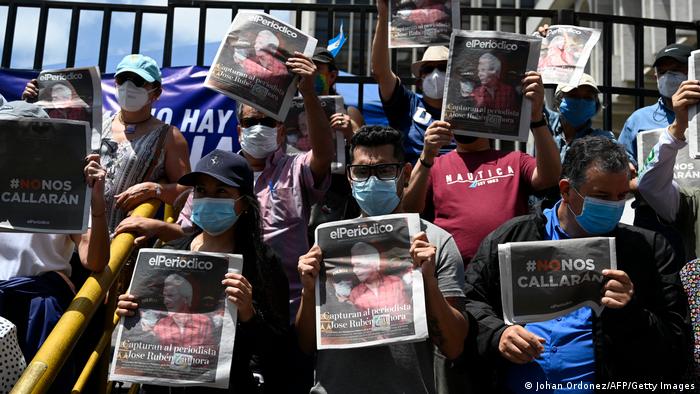Journalists protest the detention of José Rubén Zamora in Guatemala.
Guatemala, El Salvador and Nicaragua are representative cases of countries characterized by a resounding process of democratic deterioration and the siege of civil society.
In Guatemala, the undermining of the rule of law, the criminalization and harassment of human rights defenders human rights and journalists is a routine practice of the government and of a judicial apparatus that has been made available to them, as was seen in the recent arrest of Jose Ruben Zamora Marroquín, director of the newspaper El Periódico, after he published new allegations of corruption against various government officials. The student protest at the University of San Carlos is only an expression of the fed up with authorities that neither assume citizen rights, nor respect the independence of the judiciary and other institutions.
International claims are always challenged here and in neighboring El Salvador as “interference” in internal affairs, thus trying to cover up the autocratic actions of their rulers. El Salvador lives in a state of emergency, prolonged for the 4th time by the President Bukele arguing that since the end of March, 46,000 members of youth gangs (maras) have already been captured. The policy of incarceration with a high degree of arbitrariness underlines the president’s practice of wanting to present himself as a “heavy hand” actor without respecting institutional limits.
The rampage in the persecution practiced in Nicaragua has reached a new culmination in the announcement by the Nicaraguan vice president of wanting to prosecute “crimes against spirituality” as a new repressive variant that the Daniel Ortega regime has been developing in Nicaragua with crimes such as “undermining national integrity” . After suspending the service of six Catholic radio stations in the Diocese of Matagalpa, Bishop Rolando Álvarez of that diocese is now being attacked with the deployment of Sandinista Police agents, keeping the headquarters of the Curia under siege. At the same time, he follows the policy of canceling the legal status of many NGOs in the country and jailing people who speak out against the regime.
The Alliance for Development in Democracy
In the face of this democratic and institutional decline, regional and international efforts are required. The next meeting of the Alliance for Development in Democracy (ADD) is scheduled for September, to which Costa Rica, Panama and the Dominican Republic belong, who assumed with their first meeting in September 2021 a proposal for regional integration “in the framework of democracy, human rights and the goals of sustainable development”. These three countries are considered, given the decline of the other partners of the Central American Integration System (SICA), as enclaves of stability in the midst of a region with weak multilateral bodies and a recent history of acute institutional deterioration. The institution was headless for a year due to the lack of consensus in the election of a new secretary general.
Thus, SICA has been unable to strengthen democracy in the region; this task seems to correspond more to the ADD, which to date has not shown great interest in intervening so as not to enter into an open confrontation with the presidents of the Northern Triangle. Although the commitment based on the defense of open societies and green development covers very broad goals, in essence it is an initiative to promote democracy, the rule of law and economic growth in Central America against the autocracies of El Salvador and Nicaragua and a Guatemala that sinks deeper and deeper into corruption and misgovernment. That is why, in order not to generate resistance on the part of these countries, an attempt was made to articulate a very broad cooperation framework oriented towards private companies, with the intention of channeling cooperation funds to all the countries of the region. Although an Action Plan was announced and US support to date, the ADD has proven to be very inoperative.
The US unilateral agenda
It is largely the political absence and the unilateral interest of the United States in the region that has caused the negative results today: by insisting centrally on the fight against drugs and the control of migration, leaving in the background the defense of democracy and the rule of law, practices have expanded in the three countries of the Northern Triangle that only document the advance of political and administrative corruption. The abuse of the authorities against opposition people and institutions are present day by day in the newspapers, in the demonstrations in the streets and in the social work of many NGOs. The individual sanctions applied by the US have not produced results. Larger economic sanctions, such as the recently announced suspension of the purchase of sugar from Nicaragua or even a possible cancellation of this country’s membership in the Free Trade Agreement with Central America, have not been implemented. The same goes for the credit policies that are still in place without wanting to put a limit on the autocratic exercise of power: thus, the Central American Bank for Economic Integration (CABEI) continues to support Nicaragua with a loan of 200 million dollars to reduce the impact the increase in fuel prices on the Nicaraguan economy; With the support of Germany, a support program for micro-enterprises has recently been launched that aims to favor business owners and channel sub-loans to strengthen economic dynamics and job creation. If international actors fail to assume a joint position, the advance of authoritarianism and non-democratic practices will spread further in the region.
(ers)
The Northern Triangle of Central America: a zone of democratic deterioration

